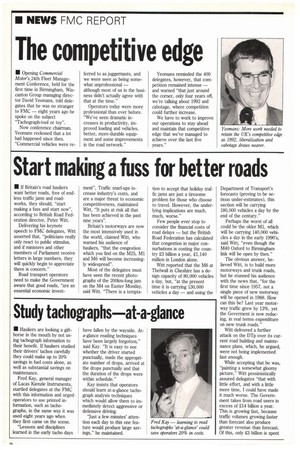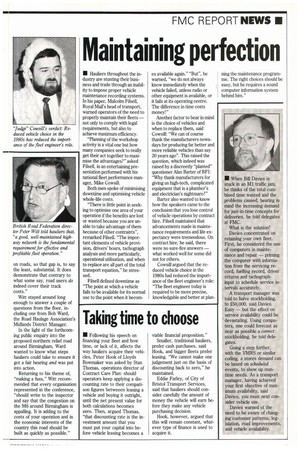Start making a fuss for better roads
Page 36

Page 37

If you've noticed an error in this article please click here to report it so we can fix it.
• If Britain's road hauliers want better roads, free of endless traffic jams and roadworks, they should, "start making a fuss and start now", according to British Road Federation director, Peter Witt.
Delivering his keynote speech to FMC delegates, Witt asserted that, "politicians really only react to public stimulus, and if ministers and other members of Parliament receive letters in large numbers, they will quickly begin to appreciate there is concern."
Road transport operators need to make the Government aware that good roads, "are an essential economic invest ment", Traffic snarl-ups increase industry's costs, and are a major threat to economic competitiveness, maintained Witt, "It puts at risk all that has been achieved in the past nine years".
Britain's motorways are now the most intensively used in the world, claimed Witt, who warned his audience of hauliers, "that the congestion which you find on the M25, MI and M6 will become increasingly widespread".
Most of the delegates must have seen the recent photographs of the 200km-tong jam on the M4 on Easter Monday, said Witt. "There is a tempta tion to accept that holiday traffic jams are just a tiresome problem for those who choose to travel. However, the underlying implications are much, much, worse."
Few people ever stop to consider the financial costs of road delays — but the British Road Federation has calculated that congestion in major connurbations is costing the country 23 billion a year, 21,140 million in London alone.
Witt reported that the M6 at Thelwall in Cheshire has a design capacity of 80,000 vehicles a day, but, "at the present time it is carrying 130,000 vehicles a day — and using the Department of Transport's forecasts (proving to be serious under-estimates), this section will be carrying 180,000 vehicles a day by the end of the century."
Perhaps the worst of all could be the older Ml, which will be carrying 140,000 vehicles a day in the early 1990's, said Witt, "even though the M40 Oxford to Birmingham link will be open by then."
The obvious answer, believed Witt, is to build more motorways and trunk roads, but he stunned his audience with the news that, "for the first time since 1957, not a single piece of new motorway will be opened in 1988. How can this be? Last year motorway traffic grew by 13%, yet the Goverment is now reducing, in real terms expenditure on new trunk roads."
Witt delivered a further attack on the Dip over its current road building and maintenance plans, which, he argued, were not being implemented fast enough.
While accepting that he was, "painting a somewhat gloomy picture," Witt pessimistically assured delegates "that with little effort, and with a little more time, I could have made it much worse. The Government takes from road users in excess of 214 billion a year. This is growing fast, because traffic volumes growing faster than forecast also produce greater revenue than forecast. Of this, only 23 billion is spent on roads, so that gap is, to say the least, substantial. It does demonstrate that contrary to what some say, road users do indeed cover their track costs."
Witt stayed around long enough to answer a couple of questions from the floor, including one from Bob Ward, the Road Haulage Association's Midlands District Manager.
In the light of the forthcoming public enquiry into the proposed northern relief road around Birmingham, Ward wanted to know what steps hauliers could take to ensure it got a fair hearing and was put into action.
Returning to his theme of, "making a fuss," Witt recommended that every organisation represented in the conference, "should write to the inspector and say that the congestion on the M6 around Birmingham is appalling. It is adding to the costs of your operation and in the economic interests of the country this road should be built as quickly as possible."
















































































































